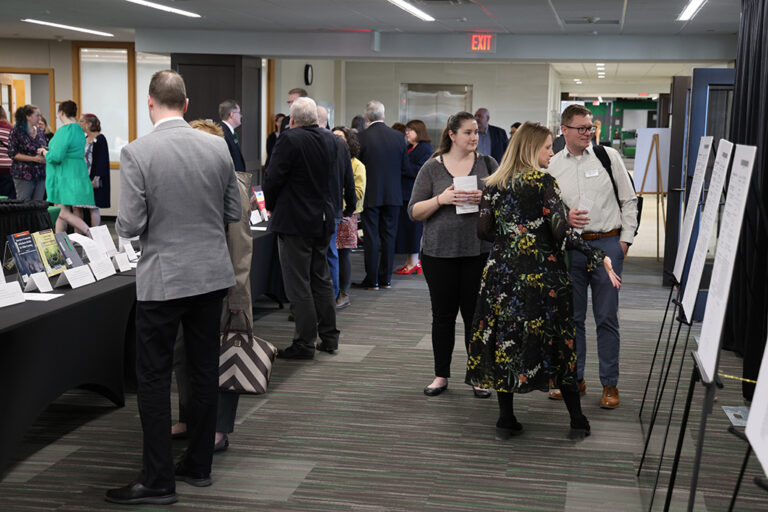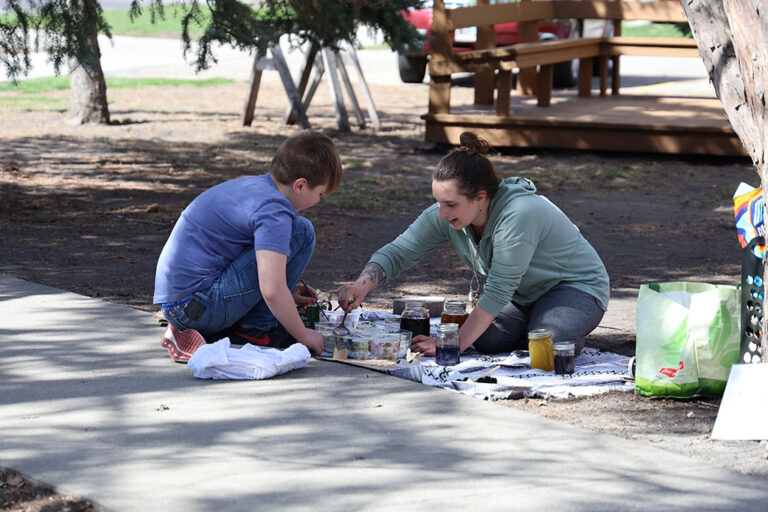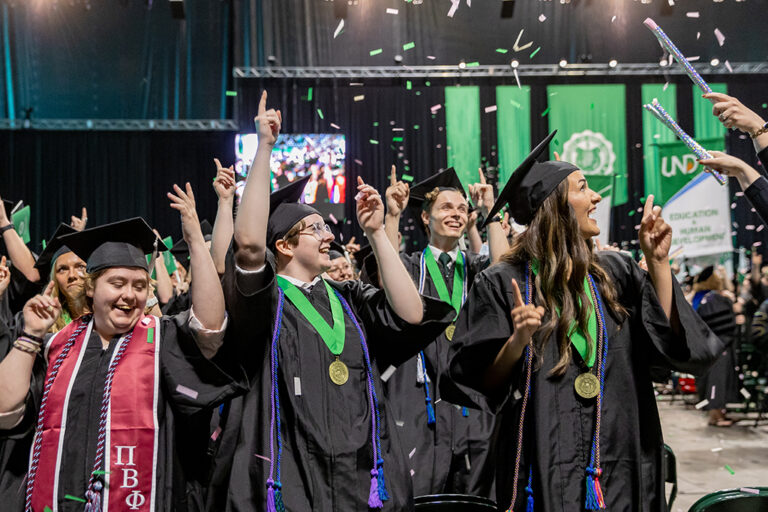A Q&A with Ike Umunnah, UND Law ’12 and high-level Biden Administration appointee
UND was ‘best, most supportive launching pad anyone could hope for,’ says director of U.S. Economic Development Administration’s Office of Public Affairs

From the U.S. Army to Target to the U.S. Economic Development Administration, Ike Umunnah has built an exceptional career focused on connecting and serving others. Umunnah, who graduated from the University of North Dakota with a law degree in 2012, credits the Law School with many of the opportunities he received after leaving Grand Forks, such as attending Harvard, where he obtained a master’s degree in policy and management. He also left his mark on UND by founding the Black Law Student Association.
With an appointment from President Biden, Umunnah now leads the Office of Public Affairs at the Economic Development Administration within the Department of Commerce. In many ways, the role is a culmination of Umunnah’s dedication to helping others succeed. It’s also an unprecedented opportunity to chart a sustainable way out of the pandemic-induced economic hardships that many Americans still grapple with, more than a year after the virus outbreak.
“The work we are doing here is so important,” Umunnah said.
Umunnah recently talked with UND Today about his new position on the senior management team at EDA, his career in public affairs and politics as well as his time at UND School of Law. The conversation below has been edited for clarity and length.
You have been in your position since Jan. 2021. How has it been so far?
It has been fantastic! I am fortunate to have a great team working with me at the Economic Development Administration. We hit the ground running on Jan. 20. It’s often said that the government moves slowly, but that has not been my experience over the last several weeks. The people at the Commerce Department are dedicated public servants and get up every day to do good things for the American people.
The work we are doing here is so important. The recent American Recovery Act has given us a renewed commitment to helping cities and communities grow. I know that President Biden is laser-focused on helping Americans come out of this pandemic and economically stressful time stronger than ever, and we are there every step of the way to make sure that happens. We will build back better for all Americans.
We have $3 billion to help strengthen communities across America. Many cities such as Grand Forks and others across North Dakota will qualify for this recovery funding. Several years ago, for example, UND received an EDA grant for $500,000 for the Center for Innovation. I sincerely hope more communities and institutions apply for EDA funding to build back better.
How is leading the Office of Public Affairs for a federal agency different from your previous leadership role with Rockwell Automation, where you were director of Global Public Affairs?
I think all public affairs professionals, no matter where they sit, will tell you that universally the most significant challenge is ensuring that your organization’s voice is heard. The same challenges I have faced in other roles in terms of making sure our message resonates with our desired audience are the same here at the Commerce Department.
What attracted you to communications and public affairs?
The public engagement piece is what drew me to this career path. I have always had a passion for connecting with people and sharing stories, and making connections. I wouldn’t say that I ever set out to work in this field specifically, but I’m fortunate to be where I am today. You could say it was inevitable given that public affairs speaks to my strengths and allows me to be people-centric. I am grateful to have a fulfilling and purpose-driven role.

With EDA’s focus on economic development through innovation and competitiveness, what opportunities for growth do you see as the country emerges from the pandemic?
Despite the hardship we have seen over the past year, we have a unique opportunity to address and correct parts of the fundamentally broken economy. The President has given us a clear mission: Build Back Better, which is a mission I have taken to heart. Whether it be addressing inequality, access to opportunity, or supporting underserved communities, we have a renewed chance to set up future generations for greater success.
You have held leadership roles with several high-profile political campaigns, including Hilary Clinton and Joe Biden’s presidential runs. What inspired you to get involved in politics and policymaking?
I have always felt that politics and policy can and should be a driving force for good. I have seen people fall behind and overcome immense obstacles to succeed, myself included. Policymaking can break down those obstacles and give everyone, no matter where they come from, an opportunity to succeed. I want to be part of that.
When I was young, I had a terrible speech impediment that impacted my development – both in terms of my education and socially. That was a hard thing to experience as a child. I was fortunate I had a strong support system and resources to overcome that challenge. I promised myself I would not let my impediment stand in the way of achieving my goals.
Unfortunately, many have experienced the same difficulties or worse to opportunity. That’s really at the core of why I got involved in politics – to help more people have options and access. I believe that life’s challenges should not stand in the way of someone’s potential – government can and should be a part of the solution.
Throughout your career, you have served on the boards of several nonprofits and community-focused organizations. Why is it important for you to engage in such organizations and opportunities?
I believe in paying it forward. This country has given me some amazing opportunities, opportunities that could not be possible anywhere else in the world. I came from humble beginnings, had the honor and privilege of serving my country in uniform, and later was able to meet some incredible individuals through giving back with organizations like Goodwill Industries and the Milwaukee Academy of Sciences.
I’ve had the privilege to serve as a board member for both organizations, and through them, to be part of something larger than myself.
At UND, you studied law. Why did you want to get a law degree?
I am of the mind that if you are going to affect the law and change the law, then you need to know the law. I am a big history buff. Being from Virginia, the Constitution and our nation’s founding always loomed large in our collective zeitgeist, not to mention the public school curriculum. I knew I wanted to be involved in politics in some way. Law seemed to be a logical next step and one that I knew I was passionate about.
In a way, I guess you could say I wanted to follow in the founding fathers’ paths in helping to shape America.
Why did you choose to attend UND?
There were lots of reasons for me to go to UND Law. I just really felt at home there. From the moment I stepped foot on campus, I could see myself there.
As you know, UND is the smallest public law school in the country, and so I knew I would not get the same degree of individualized attention anywhere else.
Another factor was UND’s commitment to supporting veterans. UND has always had a strong commitment to America’s veterans and to ensuring they have the means to pursue their dreams and move on to the next chapter of their lives. This was important to me and made me feel like UND was a place where I would be valued and respected.
Have there been any occasions or people at UND that have made a lasting impression on you? If so, tell us about them.
Oh, yes! Professor William Johnson, who is currently Dean of the St. Louis University Law School, was a mentor to me during my time at UND Law and served as the founding advisor of the Black Law Student Association. He was my contracts professor during that time, and I’ll never forget a piece of advice he gave me that I still repeat to myself regularly in my professional career. I was feeling a little burnt out during my final year, and I remember him saying to me, “Always finish strong. Always give 100 percent, no matter how close you are to the finish line.”
He encouraged me to be true to myself, aim higher, and have confidence. He was the person who encouraged me to apply to Harvard and wrote one of my recommendations. I took his advice, and he was right. I was accepted, and the rest is history.
How has your law degree helped you in your career?
Overall, it gave me the ability to better use my critical analysis skills in formulating strategy and in dealings with people. It also instilled in me a sensitivity and greater appreciation for risk and risk avoidance and its place at the core of corporate and organizational planning and performance. After all, law school doesn’t teach you the law, it teaches you how to think in a better way, and I have put those skills to use throughout my career.
At UND, you founded the Black Law Student Association. Tell us about this experience and the importance of starting a charter.
When I arrived at UND Law, it was not as diverse as some other places, but UND did make me feel welcome. It was and continues to be a great school, but there was no diversity program or organization for people of color at the Law School.
My goal in founding the Black Law Student Association was simple: to let others like me know that they had a support system at UND. I wanted to make sure that others like me had a place to come and belong and thrive. I wanted African-American students to have a sense of community and a launching pad to build our professional network.
We succeeded in many ways, and the Black Law Student Association remains one of my proudest accomplishments.
What is the most important career advice you have ever been given?
When I was in the U.S. Army, my drill sergeant told us to always be on the far side of right. Always be so clearly in the right, both morally and ethically, that you are beyond reproach and never occupy the grey area. I take that advice seriously and apply it to how I lead my team. At EDA, I want us all to ask ourselves: “Are we doing right by our people that work here and the American people at large?”
What motivates you?
Getting up and doing the best job I can for the American people.
What makes you proud?
It makes me proud when I see young people succeed. Not just for them to succeed, but to develop and do better than the generation before them.
Any parting words of wisdom for current UND students?
Be confident that you made a great choice and you are attending one of the very best institutions, and from here you can go anywhere. From UND, I attended Harvard, entered corporate America, and received a presidential appointment for a senior role in the U.S. government. None of those things would have been possible had it not been for my time at UND, the outstanding professors, and the strong community. It is the best, most supportive launching pad anyone could hope for.


